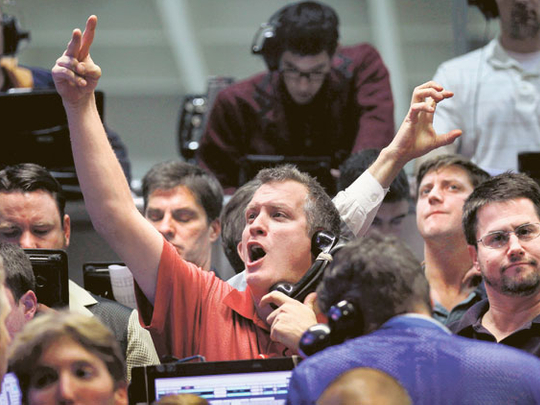
New York: An early rally fizzled on the stock market on Friday but still left the Standard & Poor's 500 index up 7.4 per cent for the week, its biggest gain since March 2009.
A surprise drop in the US unemployment rate sent stocks higher in early trading, but the gains faded during the afternoon.
The Dow Jones industrial average dropped 0.61 of a point to close at 12,019.42. The Dow ended the week up seven per cent, the largest weekly gain since July 2009.
Bank stocks rose sharply, continuing a week-long rally. JPMorgan Chase & Co. jumped 6.1 per cent, the most among the 30 stocks in the Dow average. Morgan Stanley leapt 6.9 per cent, the second-biggest gain of any stock in the S&P 500 index.
European stock indexes and the euro rose after German Chancellor Angela Merkel made a speech pushing for tighter rules on government spending. Merkel said the 17 countries that use the euro must quickly restore market confidence by making fin-ancial controls stricter.
Bond yields for Spain and Italy fell, a sign that investors are becoming more confident in the ability of those countries to pay their debt. France's CAC-40 and Britain's FT-SE each rose 1.1 per cent.
Markets could be in for more volatility this week as European leaders prepare for a summit to propose new measures for containing the crisis.
Giving up
The Labour Department reported before the market opened that the unemployment rate fell to 8.6 per cent last month, the lowest level in two years. Economists had expected the rate to stay at nine per cent. But a key reason the unemployment rate fell so much was that more than 300,000 people gave up looking for work and were no longer counted as unemployed. The Nasdaq composite index inched up 0.73 to 2,626.93. The Standard & Poor's 500 index fell 0.31 of a point to 1,244.28. The S&P surged 7.4 per cent over the week, the most since March 2009.
Decisive steps by world leaders to right Europe's teetering economy sent stocks soaring on Wednesday. The Dow jumped 490 points, its biggest gain since March 2009 and its seventh-largest one-day point gain in history. The weekly point gain of 787 in the Dow was the second-biggest in its history, following a 946-point gain in October 2008.
"This market has been gripped with fear for a long time," said Peter Cardillo, chief market economist at Rockwell Global Capital. "And I think some of these fear factors are beginning to dissipate."
Last week's strong stock performance is partially a reflection of the market's increased volatility since August, when concerns that Europe's debt was spinning out of control made dramatic stock price swings the norm. On Monday the S&P 500 broke a seven-day slide that had taken the index down 7.9 per cent.
Shrugging off fears
The improvements in the US job market are "another illustration that the US economy is, for now at least, shrugging off the global economic downturn and fears about the collapse of the Eurozone," Capital Economics Chief US Economist Paul Ashworth said in a note to clients.
Merkel and French President Nicolas Sarkozy will meet on Monday to discuss changes to European Union treaties. The talks will culminate in a summit of EU leaders on Friday, where the proposals are expected to be debated and detailed. Analysts say stricter controls on spending could encourage the European Central Bank to offer more short-term help for governments struggling with their debts.
If the European Central Bank takes a larger role in buying government debt, "it will certainly be a relief to markets," Cardillo said, "and maybe even mean Europe avoids falling into a deep recession. Not that it's going to cure all the problems of Europe."
Western Digital soared 7.5 per cent, the most in the S&P. The data storage provider raised its revenue estimate for the current quarter and said that recovery efforts at its facility in Thailand following massive flooding there were proceeding faster than had been expected.
Big Lots slumped 8.7 per cent, after the retailer reported a 76 per cent plunge in income because of lower margins and a loss related to a newly acquired Canadian business. The company buys overstocked items such as food and houseware and sells them at a discount.












